It is generally accepted that pirates are bandits and murderers, the scum of society. Most of them were, and still are. But if some thieves, crooks, and swindlers live in luxury and enjoy all the blessings of society, how can someone who robs them called a robber? It’s a controversial subject.
Some pirates of the Caribbean were educated officers and even gentlemen. They had social security, money, and a name in society. But they preferred the risk of death, knowing that piracy would make them outcasts, and they would end up on the gallows…
Human society is always unfair. There is a cruel gradation between the chosen and the plebs, the exploitation of some by others. This breeds envy and hatred. Social revolts do not arise spontaneously. The power knows this and subsidizes the primitive plebeians with handouts and brutally persecutes the educated individuals who can prepare for these revolts.
The educated pirates were motivated by their revenge on the authorities and their response to violence. There were women among the pirates. An unknown author wrote this story, and it is written in the Shakespearean language, the familiarity of which is as aesthetically pleasing as admiring the fanciful contours of a Napoleonic-era chest of drawers.
In the retelling I have tried to retain the author’s syllable, adding my findings and emotions. So, please, read on.
***
This story happened a long time ago. A girl in England married a sailor. They had a son, and the young father went to sea. And one day something happened to the mother of the child that often happens to young women when their husbands are away for a long time. She discovered that another child was living inside her, and she despaired, unable to find a way to hide her shame.
But her husband did not return, probably swept away by a storm, and the young widow retired to a village where no one knew her. Her infant son died and she gave birth to a girl, Mary Read.
They lived alone for three or four years, as long as their savings allowed. When the money ran out, the young woman’s only option was to return to London, to the home of her missing husband’s mother. But how could she be with a girl when she had started with a boy?
The widow decided to disguise her daughter as a boy and hide the secret under her clothes. In London, she agreed with her mother-in-law to live separately, and the old woman agreed to visit her occasionally to help with the household.
Little Mary grew up, playing with boys, fighting like everyone else, and so on. But then she turned thirteen, the age when girls began to notice changes in their condition and realize their purpose. By then her grandmother had died, and with her death, there was no longer any need to hide the secret. Her mother confessed everything to Mary, and the girl accepted this confession calmly, without drama, for she had long lived a boy’s life, had grown accustomed to it, and saw no reason to change her habits.
Mary was tall, well-muscled, with a boyish gait and none of the girlish attributes. She enlisted as a servant boy on a warship, where she attended her first naval school. With the outbreak of hostilities in Flanders, she joined the army, where she proved herself a brave cadet. She decided to become a cavalrywoman and soon won the admiration of many officers for her participation in mounted raids.
But you can’t hide a woman’s nature, and Mary fell in love with her friend Fleming, even though she hid her gender from him in every way. They became friends, shared all the hardships of army life, and slept in the same tent. One day, unable to resist nature, Mary revealed her secret to her lover. He was surprised at first, but she took the initiative and they soon exchanged vows. By the end of the campaign they were married, and the story of two soldiers in love made such a splash that many of their comrades helped the newlyweds with money, with which they opened a tavern on the picturesque outskirts of a town. Their friends were regulars and business was good.
Unfortunately, their happiness was short-lived when her husband fell ill and died. And a new war drove all her customers into the trenches. Having lost everything, Mary put on men’s clothes and rejoined the army. Having lost her lover, nothing pleased her, and one day she decided to change her life completely. So Mary found herself on a ship that took her across the ocean to the West Indies.

INTO A NEW WORLD.
At sea, their ship was captured by pirates. They robbed the passengers and let them go. Mary was the only English person on board, and since the captain of the pirate schooner was also from England, he decided to take her with him. The pirates had strict laws: women and children were forbidden to be on board, and death awaited those who broke the law. But they had no idea that their new mate was a woman!
The pirate ship reached the Bahamas. At that time, the King of England offered amnesty to all pirates who would give up their trade. Many accepted the amnesty and went into peaceful fishing and farming. Mary and a few of her friends traveled to the island of New Providence, where the governor needed privateers.
Soon the military conflict between the countries was settled and the privateers, having lost their status as legal privateers, continued their “trade” illegally as pirates. Our Mary realized that she was only happy when her life was in danger. In such situations, she was free from the conventions of society. But she had to live on alert, to avoid giving herself away. No one was braver than her during the boarding, she fought like a furious fury. On one occasion Mary urged the cowardly pirates to come on deck, accompanying her shouts with pistol shots. Shooting through deck slits into the hold, she killed and wounded several cowards.
There was a musician among the pirate prisoners, and when Mary saw him, she lost her peace. She fell in love with this handsome man. After giving him every sign of attention and making sure their feelings were mutual, Mary found a way to open up to her lover. The young man of flesh and blood could not resist, and they had a stormy affair. Their secrecy made their love even more romantic.
But one day danger came. The pirate quarreled with the musician, and it came to a duel. The pirate code only allowed dueling on land. The duel was set for the nearest island. Mary knew from her lover that the only weapon he possessed was a musical instrument. She wondered how to save her lover.
The schooner anchored in a secluded cove to replenish her water and provisions. As the time for the duel approached, Mary made a decision. As she approached the pirate, she pushed him and he fell.
He swung up in a scolding motion to strike at his attacker but was struck across the forehead with the hilt of his knife so hard that his nose bled.
“I’ll be damned if I don’t put a hole in you now,” he growled in anger.
Mary pointed to the shore:
“I’m waiting for you, pig, on the sand!”
In the duel, Mary showed the full force of her passion, covering her lover with her body, with her love. Her hatred for the man who had tried to rob her of her love was so strong that the first blow of her saber broke the pirate’s head. Bleeding, he fell to his knees. Before she pulled the trigger to finish off her attacker, Mary unbuttoned her shirt and revealed her white breasts, and it was the last thing his bulging eyes saw.

EPILOGUE.
Pirates were hunted down and those caught were hanged without trial. Mary Read was captured and her secret was revealed. At her trial, she declared that she had never used her sex for personal gain and had never revealed herself as a woman. She identified her lover as her husband and testified that he was a prisoner of the pirates and had never participated in their actions. She saved his life and told the court that they had planned to escape piracy at the first opportunity, dreaming of a normal life on land. Many in the courtroom sympathized with her.
But Mary Read was sentenced to death.
In her last words, she said:
“A pirate dies on the gallows if he is taken alive. But the gallows is not the worst test for men of courage. Many among you lead supposedly respectable lives, who hide behind reputations of honesty and integrity only to cheat widows and orphans, to oppress the poor who have no money to defend themselves in court. And if we were to change places, the ocean would be overflowing with villains…”
Her execution was postponed indefinitely, and it is quite possible that she would have been pardoned as time passed and passions subsided. But Mary fell ill with a severe form of fever. She died in prison.
© Copyright #217021202227

I like this web site very much, Its a rattling nice situation to read and obtain info.